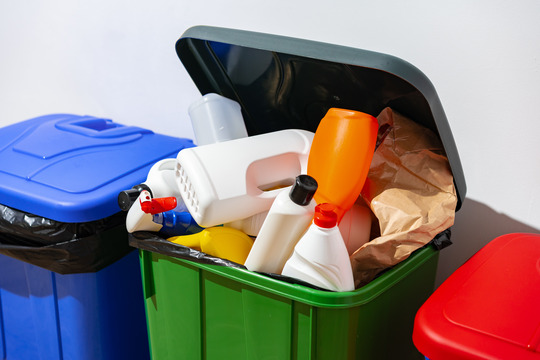
If you’ve lived in your house for a while, there are certain items that movers won’t take with you when you move. It may surprise you that your moving company may refuse many household products if deemed unsafe. Before moving day, we’ve gathered some advice on dispose of hazardous waste materials.
What Is Hazardous Waste?
You use various chemical items to care for your family, house, car, yard, and garden. Hazardous substances are present in many of these goods. Once these goods are no longer needed, they constitute hazardous trash. The EPA in the United States defines Four types of hazardous waste:
Corrosive Wastes
Corrosive wastes can destroy materials or biological tissue. One example is battery acid.
Toxic Wastes
Death or sickness can result from toxic wastes. Particular wastes pose a greater risk than others. Poisoning symptoms may arise from a small concentration of exposure to a hazardous substance. Examples include paints, cleaning supplies, pesticides, camera equipment, and art supplies.
Ignitable Waste
Ignitable waste burns and can ignite on its own. Nail polish remover, gasoline, kerosene, and charcoal lighter fluid are a few examples.
Reactive Waste
Reactive waste can heat up or explode when it reacts with water, air, or other materials. Examples of acids are those that heat up and splatter when combined with water.
According to the EPA, the typical home disposes of hazardous waste of one pound annually. It implies South Carolina must manage 1,150,000 pounds of hazardous home trash annually.
How To Dispose Of Hazardous Waste
Before moving, it advises that you inventory all the dangerous materials in your home. Knowing what you’re dealing with will help determine how to eliminate things. That may:
- Research the laws governing your county. You must know your local government’s regulations on dispose of hazardous waste before deciding what to do. Before you do anything else, familiarize yourself with the regulations that apply to different counties. To find what comes up, search “how to dispose of hazardous waste” + “[your county].”
- Give them away. Find out if a friend or relative will take the items off your hands.
- Bring Them to a Location for Waste Collection. Hazardous waste can be accepted for free in most cities. Most locations are only open a few days a month, so call ahead or check online before you arrive.
- Bring Them to the Dump. You can take some solid waste to the dump in your community. Verify the kinds of rubbish they take and whether there are designated drop-off locations for what you’re getting rid of.
- Bring Them to an Auto Garage. Transmission and motor oil are recycled at auto shops. Please get in touch with the local mechanics and inquire about their waste product processing policies.
- Arrange for a Pickup. Waste management businesses will send a truck to dispose of hazardous waste from your home for a nominal cost. Find out what materials they handle to avoid leaving off anything they won’t accept.
- Make a Recycling Kit Request. Homeowners may receive recycling kits via mail from certain trash management companies. Just fill the box with rubbish after it comes and return it. Make sure the company is sending hazardous waste by mail. And ensure it is safe before sending anything for which you might be held accountable.
- Mix and Flow. Homeowners can cut certain dangerous materials by flushing them down the drain and neutralizing them with water. Contact your neighborhood to find out what you want to dispose of in this way.
- Reuse. Although it isn’t a method for getting rid of HHW, this is a better choice because it leaves less carbon imprint. One choice is to remix paint thinners and solvents. To achieve this, completely close the container and let the paint sink to the bottom. After that, you can use the solvent again on top. After drying the sludge, trash it.
What You Should Not Do
- Blend. It is a big no-no since combining several toxic ingredients and liquids in one container could be risky.
- Chemical, petroleum, and dispose of hazardous waste on the ground or down the drain. It is illegal to do this.
- You should dispose of and pick up the hazardous garbage as regular trash. Waste management personnel are also forbidden to move these things.
The Importance Of Disposing Of Hazardous Waste
The term “properly hazardous waste” was well-earned. Hazardous garbage can endanger anyone nearby because it is volatile and toxic. Certain substances, like syringes, asbestos, medications, toilet bowl cleaning, and gasoline, are toxic at times, but this is not always the case.
Hazardous waste disposal, done incorrectly, might have serious consequences. It can:
- Degrade the ecosystem
- Physically harm sanitation personnel as they go about their jobs, not anticipating potentially hazardous objects like needles.
- Use hazardous chemicals to contaminate wastewater treatment facilities. And septic tanks by flushing them down the toilet or drain.
- Endanger kids or animals if put within easy reach at home.
- Cause long-term health problems for workers if not kept in designated areas in workspaces.
- Individuals and enterprises must understand hazardous waste. It can be eliminated with proper disposal methods and the reasons for taking proactive measures.
However, hazardous waste disposal can be fatal if not disposed of correctly and is frequently included on the list of goods that cannot be moved. As a result, you must dispose of them using the above procedures to avoid mishaps. Or you may contact a full-service moving company. They will do all for you.



